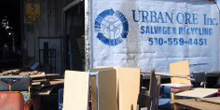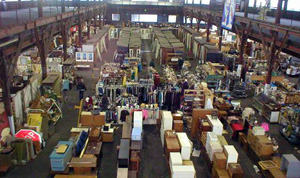Zero Waste Case Study: Berkeley

Reuse Partnership
Berkeley has a longstanding commitment to reducing and ultimately eliminating the waste that goes to landfills and established one of the first municipal recycling programs in the nation.
Reuse is a key zero waste strategy for extending the life of materials and products. In 2019, the city adopted the Berkeley Single Use Foodware and Litter Reduction Ordinance to reduce the use and disposal of single use foodware, including cups, lids, utensils, straws, clamshells, and other disposables that contribute to street litter, marine pollution, harm to wildlife, greenhouse gas emissions, and waste sent to landfills.
Urban Ore contracts with the City of Berkeley for exclusive salvage rights of reusable materials from the city’s transfer station tip floor. Urban Ore is allocated space on the Transfer Station property for a staff shed and the salvage vehicle which transports the salvaged materials to their retail Eco Park in South Berkeley. Urban Ore salvagers also spot and report hazardous materials to City staff to avoid illegal disposal.
- Assists in attaining Berkeley's Zero Waste and Climate Action Plan goals
- Reducing manufacturing resource use and energy impacts by returning goods and materials to the commerce cycle
- Reduces contract costs and additionally generates profit because self-haul customers all pay the $126/ton tipping fee
 Urban Ore’s 30,000 square foot reuse warehouse finds new homes for household items and building materials.During 2014, Urban Ore staff removed approximately 825 tons of reusable material from the transfer station floor. This represented approximately 12% of Urban Ore’s estimated overall reuse of 7,000 tons of items per year. The remaining 88% comes from the company's collection service and 50 - 100 vehicles that bring in loads each day. The weight of the material collected for reuse is roughly equivalent to what the Berkeley Ecology Center’s residential curbside recycling program collects. In 2017, Urban Ore also recycled 335 tons of materials, including ferrous and non-ferrous metals, glass, ceramics, electronics, plastics, textiles, auto batteries, paper and cardboard.
Urban Ore’s 30,000 square foot reuse warehouse finds new homes for household items and building materials.During 2014, Urban Ore staff removed approximately 825 tons of reusable material from the transfer station floor. This represented approximately 12% of Urban Ore’s estimated overall reuse of 7,000 tons of items per year. The remaining 88% comes from the company's collection service and 50 - 100 vehicles that bring in loads each day. The weight of the material collected for reuse is roughly equivalent to what the Berkeley Ecology Center’s residential curbside recycling program collects. In 2017, Urban Ore also recycled 335 tons of materials, including ferrous and non-ferrous metals, glass, ceramics, electronics, plastics, textiles, auto batteries, paper and cardboard.
Urban Ore replaced all of the cash registers with a computer-based point-of-sale system that calculates monthly sales by category of merchandise. The top sellers have been: doors, furniture, windows and hardware.
A for-profit enterprise, Urban Ore provides 40 living wage staff jobs with income-sharing performance incentives, profit sharing, and benefits. In 2014, Urban Ore supplied nearly $2.6 million dollars' worth of construction materials and other goods to local artisans, contractors, property managers and residents. These goods then circulate throughout the local economy, providing a community benefit.
Contractual Arrangement
The city contracts with Urban Ore to removing reusable materials from the transfer station floor. This represents a landfill cost savings because the city would otherwise haul these materials to the landfill paying transportation costs plus $41.14 per ton in tipping fees. The actual benefit is even greater because the city receives $126 per ton at the fee gate. Urban Ore salvagers also spot hazardous materials that can be pulled out at the transfer station for proper management.
In the past, the city paid $33,000/year Urban Ore to divert 825 tons of material for reuse, but since 2012 the innovative reuse business has operated without any city funding.
Advantages
- Environmental Benefits of Reuse: Reuse is a priority zero waste strategy because it extends the life of materials without significant additional processing. This reduces pollution and greenhouse gas emissions.
- Community Development: Reused goods and building materials support low income community members and are often used for community theater and artwork.
- Cost Savings: The city saves money by avoiding disposal hauling and tipping fee charges.
- Transfer Station Alternative: Under the current agreement, customers may drop-off many reusable goods at Urban Ore for free and receive cash or store credit for some items. This diverts materials from the transfer station and landfill efficiently.
- Screen Out Hazardous Materials: Salvaging reusable materials from the transfer station allows sorters to identify and remove hazardous and banned materials from disposal.
Disadvantages/Omissions
- Reuse Capacity: Large-scale reuse contracts require contractors with reuse expertise and reuse warehouse capacity. Affordable siting of reuse facilities can be challenging.
- Short-term Agreement: Short-term reuse agreements limit mid- and long-term planning. For many years the city used a month-to-month agreement and now is giving short term licenses ranging from as long as three or five years to six-month extensions.
- Transfer Station Design: The existing structures on the city-owned 9.6-acre transfer station site were not designed to support reuse. Both the city and the contractor have invested in redesigning the transfer station for easier capture of potentially reusable and recyclable materials, but front-end design-for-reuse is preferable.
